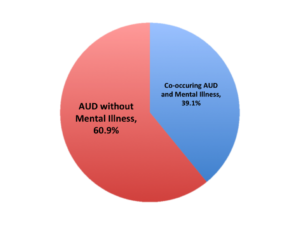Reduce Stigma
"Rather than lack of insurance, fears of stigmatization and beliefs that treatment is ineffective explain the lack of AUD treatment in the United States."
Grant BF, Goldstein RB, Saha TD, et al. Epidemiology of DSM-5 Alcohol Use Disorder: Results From the National Epidemiologic Survey on Alcohol and Related Conditions III. JAMA Psychiatry. Published online June 03, 2015. doi:10.1001/jamapsychiatry.2015.0584.
The concept of "once an alcoholic, always an alcoholic" is barrier to treatment for people struggling to control their alcohol intake because it suggests that the shame and stigma associated with seeking treatment for alcohol misuse will follow them long after they have successfully recovered.
Additionally, there is a strong social myth that everyone with an addiction also has a mental illness. This myth may come from the tendency for patients to be referred to a psychiatrist, psychologist, or other mental health professional for addiction treatment. The data does not back the myth of alcohol use disorder as a mental illness:

SOURCE: Behavioral Health Trends in the United States: Results from the 2014 National Survey on Drug Use and Health, SAMHSA
In fact, research indicates fewer than 40% of those with an alcohol use disorder are in need of treatment for co-occurring mental illness.
Rock Bottom mentalities promote shame
You probably wouldn't wait until heart failure to make recommendations and possibly even prescribe medications to your patients with high blood pressure and high cholesterol.
You probably encourage your patients to watch for general, early warning signs that they may be experiencing a health issue. You want your patients to feel comfortable coming to you if they are experiencing sudden weight gain or loss, frequent fatigue, and changes in appetite.
You probably wouldn't tell a patient with cancer that it has returned because they were not fully committed to getting better. And you wouldn't keep treating patients with the same treatments that have failed for them in the past.
When alcohol use disorder is talked about with the same medical tone, focusing on risks and reducing both short and long-term harms, the stigma associated with addiction begins to fade and you will be better able to hold an open conversation, free of judgement, where your patient will be honest with you about their alcohol consumption.
